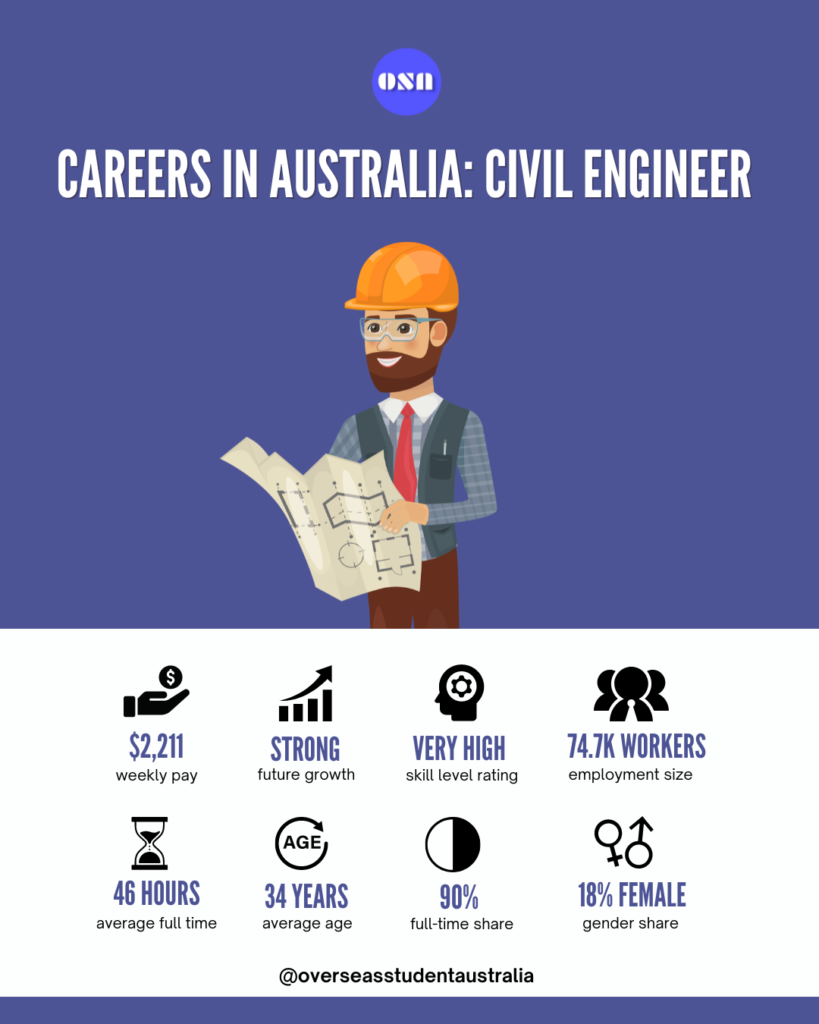How to become a Civil Engineer in Australia with a salary guide

Civil engineering is a specialisation in engineering stream that delves into designing, facilitating, monitoring, maintaining and coordinating the construction of civil projects like bridges, highway roads, gas and water pipelines, air and seaports, railways and structures.
Are you thinking about what it would take you to become a civil engineer in Australia?
You are in the right place!
In this blog, you will discover all the vital information you need to know on how to become a civil engineer in Australia.
Overview of Civil Engineering in Australia
Civil engineers are vital in society; they construct infrastructure that is needed in modern society such as bridges, railways and so on.
There are over 74,000 civil engineers currently employed in Australia, and there is still high demand for professionals in this sector.
This is a great career path for you if you are tactical, responsible and a critical thinker.
Size of the industry
There are over 74,000 civil engineers in the Australian work force currently.
Statistics show a projected strong growth of 13.4% by 2026, making this profession a reliable career path to work in.
Popular Locations
Here below is the percentage of civil engineers in different areas of Australia by state and territory:
- New South Wales 33.2%
- Queensland 24.0%
- Victoria 22.2%
- Western Australia 12.7%
- South Australia 4.8%
- Northern Territory 1.3%
- Tasmania 1.2%
- Australian Capital Territory 1.1%
This is why it is vital to consider a potential career path when selecting a city to study.
Click here to find out how to choose a city to study in Australia.
Industries where civil engineers are needed
The Professional Scientific and Technical Services industry employs up to 43% of the civil engineers’ workforce, which is the largest share of all their employers. This industry is made up of:
- Advertising and promotion researchers
- Architects and Designers
- Computer system specialists
- Lawyers
- Scientists
Other industries account for the remaining 57% of civil engineers in Australia. The industries include:
- Construction 29.1%
- Public Admin and Safety 11.9%
- Transport, Postal and Warehousing 5.2%
- Other industries 10.9%
Hours of work
In Australia, around 90% of employed Civil engineers work full-time hours in all their jobs combined.
Full-time workers work an average of 46 hours per week. This is similar to the working hours average for all jobs in Australia (44 hours per week).
About a third of workers regularly work overtime or extra hours (either paid or unpaid).
Age
The average age of civil engineers is 34 years, which is younger than the all-jobs average of 40 years.
A large share of workers (30.6%) is within the age brackets of (25 to 34) years.
Gender
With over 74,000 civil engineers in Australia, females account for 18% of the entire workforce, while males account for 82%.
This is 30% below the all-jobs average (48%) for females and 34% above the all-jobs average for males.

What are some of the skills required to become a civil engineer in Australia?
Here are some essential skills you must have to become a civil engineer in Australia:
- Critical thinking
- Mechanical and Technical design skills
- Building and construction
- Industry Software knowledge
- Operation analysis
- Engineering and Tech skills
- Mathematical skills
- Inductive and Deductive reasoning skills
- Problem-finding and Problem-solving skills
- Creative thinking
- Proper management and supervisory skills
- Time management
- Analytical skills
Note that skills can be improved through training or experience.
What are the tasks and duties of a civil engineer in Australia?
Here are some of the tasks and duties performed by civil engineers:
- Planning, facilitating and monitoring construction projects from start to finish.
- Supervise site workers and ensure adequate supply of needed equipment and resources.
- Check the necessary costs required to cover the development of a construction project.
- Cooperate with other site professionals to ensure a smooth flow of work.
- Develop plans, proper measurements, drawings and reports about ongoing site.
- Responsibly make use of funds.
- Project modelling using the latest standard software.
- Helping government bodies create a detailed annual civil development schedule like bridges to build, roads to repair, railways to construct etc.
- Analyse and evaluate risks of construction involving natural disasters
- Investigate the standard of materials used on site
- Drafting of site activity schedule
How much do civil engineers earn in Australia?
Civil engineers salaries differ depending on their level of education, skill and experience in the industry.
Average full-time earnings are $2,211 per week, this is much higher than the average pay of all other jobs in Australia ($1,593 per week).
The average hourly pay for civil engineers is $57, which is more than all jobs average pay ($41 per hour).
Essential steps to becoming a civil engineer in Australia
Civil engineering is known to be a very technical and delicate profession because it deals with massive capital projects which are most often accessible by the general public.
If construction is not completed as per the standards, it could endanger several lives and property.
The nature of this job makes it a relatively harder job than many other professions; However, the process needed to become a civil engineer is straightforward and as follows:
Step 1: Get a senior secondary certificate of education
Steps to become a civil engineer start from your high school years.
This is the first necessary qualification you need to get. Subject requirements for senior secondary education are Mathematics, English, Physics, and Chemistry.
The requirements can vary in different universities across Australia for getting entry into bachelor’s degree in civil engineering.
Step 2: Get a Bachelor’s Degree
The next step is to complete a 4-year undergraduate degree course in engineering at any accredited university you choose, offering civil engineering as a major.
The average cost of getting a bachelor’s degree in civil engineering in Australia ranges from $25,000 to $32,000 per year.

Step 3: Obtain a professional membership
As a civil engineer, you can apply for professional membership as a student, graduate, member or fellow in Australia. Some of the professional membership bodies recognised in Australia are:
The Association of Professional Engineers is a top union in Australia that supports its members concerning workplace issues, professional development, career support and various other services. The membership fee is quite relative, but on an average costs about $300 to $500 per year.
The Master Builders Association is the leading building and construction industry association across in Australia.
Engineering Australia is the peak body for engineering in Australia. Membership application costs about $300 to $400 per year.
While you can get a student membership with these organisations while studying engineering courses, a professional membership will be required to work as an independent engineer in Australia (Explained in next step).
Although after completing a degree, you can apply for graduate membership with these engineering bodies as well.
Step 4: Get a Professional Engineer’s License
It is necessary to have completed at least 4 years of work experience under the supervision of a Professional Engineer to be licensed as a Professional Engineer in Australia. This license will be requested by an employer before you can work independently on the jobs.
It is important to check the state or territory’s license requirements where you will be working as a civil engineer.
So, it is quite easy to say that it takes around 8 years or more to become a civil engineer in Australia.
But why stop with a Bachelor’s degree only? You can continue to upskill to move up the ladder in your career by completing a Master’s degree.
Step 5: Complete a Postgraduate degree
It is not compulsory to have a Master’s degree in civil engineering to become a civil engineer in Australia, but having one will help your career immensely. Specially, when the pay in this industry is determined by your qualifications, experience and skills.
The average cost of getting a master’s degree in civil engineering in Australia ranges from $25,000 to $40,000 per year.
Many international students who are studying engineering programs in Australia also tend to complete a professional year program as well. This program is not required for local students but international students who are keen to learn further about the Australian workplace environment and seeking extra points for migration purposes undertake this course.
We have explained about this program in a detailed video below.
Step 6: Go next level with Chartered credentials
If you are serious about your career in Engineering then you can look into
It is the highest level of credentials for an engineering professional in Australia. It recognises individuals special dedication, skills, knowledge and talent in the industry.
To become eligible for these credentials, you will need to be a member of Engineer Australia and at least 5 years of experience in the industry.
Here are more details on this program.
Popular universities for learning civil engineering
Here are some popular universities to complete a degree in civil engineering in Australia:
- University of Melbourne
- University of Sydney
- University of New South Wales
- University of Adelaide
- Monash University
- Queensland University of Technology
- University of Western Australia
- Curtin University
- RMIT University
- Swinburne University of Technology
Future growth of the civil engineering career in Australia
Civil engineering is a very lucrative field to start a career path in. With the sector growing strongly, they can work in a very wide range of specialties such as:
- Structural engineer
- Highway/railway engineer
- Hydraulic or gas pipeline engineer
- Construction designer
- Environmental engineer
- Construction manager
- Geotechnical engineer
Civil engineers can work in different industries such as:
- Transport
- Mining
- City planning
- Construction

The government data suggests that there will be a 13.4% growth in civil engineer professionals till 2026. So this profession is expected to grow strongly in the years to come.
Aside from the technicalities of the profession, there is definitely an amazing feeling when desired images are brought into reality.
The best part of this career is knowing how your contribution will have a massive impact on society for years to come.
And that is all you need to know about becoming a civil engineer in Australia. Let us know the next career you would like us to cover in the comment section below.


